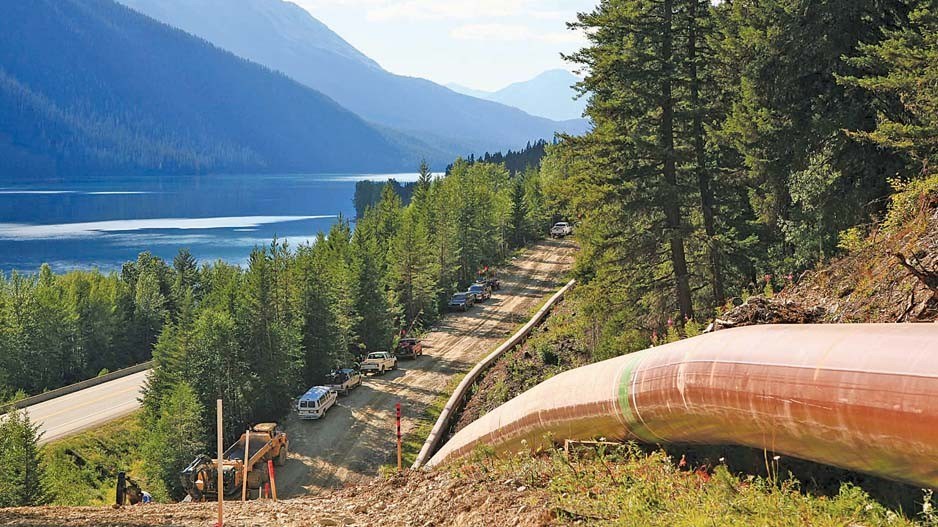British Columbians have spent almost a decade pondering the benefits and drawbacks of the Trans Mountain Pipeline expansion.
In January 2014, support for the proposed project – which sought to twin an existing pipeline between Alberta’s Strathcona County and Burnaby, and raise the nominal capacity of the system to 890,000 barrels a day – stood at 48 per cent, with opposition at 43 per cent.
Four years later, in May 2018, the federal government paid $4.5 billion to purchase the Trans Mountain Pipeline, as well as its proposed expansion, from Kinder Morgan (NYSE:KMI). A year after the acquisition, in May 2019, the federal government announced the re-approval of the project, which had seen its share of complications since its inception, including a change of government in Victoria and public protests around the existing facility.
Earlier this month, Research Co. and Glacier Media analyzed the views of British Columbians and Albertans on the Trans Mountain Pipeline expansion. The surveys outline an increase in public support in one province, and steady numbers in the other.
More than half of British Columbians (55 per cent) told us that they agree with the decision to re-approve the expansion, while 24 per cent disagree and 21 per cent are undecided. This represents a four-point increase in support for the project since our July 2022 survey. This month’s result is just one point below what we measured in June 2019, immediately after Ottawa’s re-approval was announced.
In spite of the rise in the provincewide numbers, we see a significant gender gap in British Columbia. While almost two thirds of men (65 per cent) are in favour of the Trans Mountain expansion, support drops to 47 per cent among women.
Majorities of British Columbians who voted for the BC Liberals (73 per cent) and the BC New Democratic Party (NDP) (57 per cent) in the 2020 provincial election are in favour of the expansion. In stark contrast, fewer than two in five BC Green Party voters (37 per cent) feel the same way.
In Alberta, the needle has barely moved, with 67 per cent of residents (down two points since 2022) agreeing with the decision to re-approve the pipeline expansion, while only 15 per cent disagree (unchanged) and 17 per cent (down two points) are undecided.
Satisfaction with the project going ahead is slightly higher among Albertans who voted for the United Conservative Party (UCP) in last month’s provincial election (67 per cent) than among those who cast ballots for the Alberta NDP (62 per cent).
This year, the perceived level of strong activism against the project has plummeted. Only 20 per cent of Albertans (down five points) want their provincial government to do anything necessary to ensure that the Trans Mountain expansion does not happen. In British Columbia, 28 per cent of residents feel the same way – also down five points since 2022 and significantly lower than the 46 per cent observed in June 2019.
More than a third of British Columbians (36 per cent, down four points) and one in four Albertans (25 per cent, down three points) think the Trans Mountain expansion threatens the health and safety of residents. In B.C., these negative views on the project are more prevalent among those aged 18 to 34 (57 per cent) than among their counterparts aged 35 to 54 (40 per cent) and aged 55 and over (22 per cent).
In one province, the notion that the current federal government mismanaged this file remains strong. Three in five Albertans (60 per cent, down one point) are disappointed with the way the federal government has handled the Trans Mountain Pipeline expansion. In British Columbia, just under half of residents (48 per cent, down three points) concur.
The employment and energy costs questions see little change from 2022. More than seven in 10 British Columbians (71 per cent, unchanged) and Albertans (79 per cent, up one point) think the Trans Mountain pipeline will create hundreds of jobs for residents of their province. More than a third of Albertans (37 per cent, down three points) and British Columbians (36 per cent, down one point) assume that gas prices will be lower now that the Trans Mountain Pipeline has been re-approved.
Our review of public sentiment on the Trans Mountain Pipeline expansion continues to show clear difference in the two provinces where the facility is being built. Albertans remain confident about the project’s benefits and are particularly scathing when asked to rate the federal government’s performance.
In British Columbia, the notion of the project jeopardizing the health and safety of residents dropped from almost half in 2019 to fewer than three in 10 in 2023.
Mario Canseco is president of Research Co.
Results are based on an online study conducted from June 10-12, 2023, among 800 adults in British Columbia and 800 adults in Alberta. The data has been statistically weighted according to Canadian census figures for age, gender and region in each province. The margin of error – which measures sample variability – is plus or minus 3.5 percentage points for each province, 19 times out of 20.




